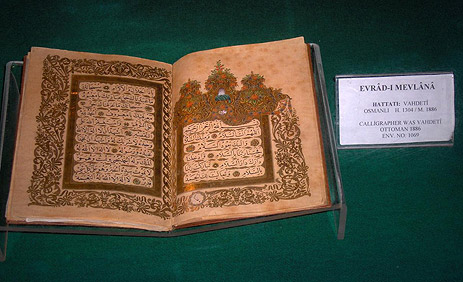Image Resource Bank
Image Gallery |  15 of 15
15 of 15 
Prayers by Mawlana Rumi, Nineteenth-Century Ottoman Calligraphy
This is a book of devotional prayers (awrad) composed by the mystic, poet, and theologian Rumi (d. 1273 CE). It would have been used by the order of Sufi dervishes that Rumi founded, an order known as the Mevlevi. The devotional prayers combine Qur’anic phrases invoking God’s mercy and majesty with a rhythmic structure suited to individual recitation, group chanting, and mystical sessions. Prayer books, along with the Qur’an and prized poetry, generated a tradition of exquisite calligraphy and book making. But Rumi is much better known for his ghazals and his Masnavi, or “couplets,” a six-volume work of mystical anecdotes. Rumi is still very popular throughout much of the Middle East today, and he even has a growing following in the West. For example, many modern Iranian artists—from respected poets like Ahmad Shamlou (d. 2000 CE) to pop and rock bands—have eagerly recorded their own versions of Rumi’s poetry.
Name: Prayers by Mawlana Rumi, Nineteenth-Century Ottoman Calligraphy
Artist: Shevket Vahdeti (1833–1871)
Material: Ink and paint on paper
Size: Unknown
Date: 19th century
Place of Origin: Unknown
Location: Mevlana Museum, Konya, Turkey
Source and Registration#:
Wikimedia![]() , (accessed February 5, 2010).
, (accessed February 5, 2010).
Attribution: Work by Georges Jansoone
License: Creative Commons Attribution 3.0 Unported![]() (accessed February 5, 2010).
(accessed February 5, 2010).

 Michael Sells
Michael Sells
John Henry Barrows Professor of Islamic History and Literature, Divinity School, The University of Chicago




